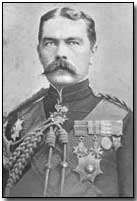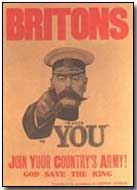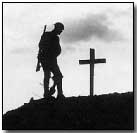Feature Articles - Kitchener's Lost Staff
 On the afternoon of 5th
June 1916 HMS Hampshire set sail for Archangel, Russia with Field Marshal
Earl Kitchener
aboard.
On the afternoon of 5th
June 1916 HMS Hampshire set sail for Archangel, Russia with Field Marshal
Earl Kitchener
aboard.
He was bound for Petrograd at the invitation of Tsar Nicholas of Russia who wanted talks with the War Minister about the war on the eastern front. Three hours into the voyage, the cruiser struck a mine off Marwick Head, Orkney and sank almost immediately. Kitchener and his Staff perished, along with the officers and nearly all the men of the ship. Just 12 survivors from a crew of 655 managed to find their way ashore.
We have discovered that certain members of Kitchener's Staff who died in the sinking of the Hampshire, are not listed in Commonwealth War Graves Commission Registers. The Commission will be raising our findings with the Ministry of Defence, and a decision will be made with regard to each man's eligibility for commemoration. Their names appear below with biographical details taken from The Times newspaper of June 7th and 8th 1916.
Temporary
Brigadier General Sir Hay Frederick Donaldson KCB
Chief Technical
Adviser to the Ministry of Munitions
Sir Hay Frederick Donaldson was Chief Technical Adviser to the Ministry of Munitions. He was appointed to that position in September last, and in order to accept it resigned the post of Chief Superintendent of the Royal Ordnance Factories, which he had held since 1903.
He accompanied the Minister of Munitions on the visit he paid a year ago to Manchester and other industrial centres to promote the organisation of our engineering resources for the production of shells, and on that occasion Mr. Lloyd George paid a high tribute to his "skilled, prudent, tactful, and resourceful administration" of Woolwich Arsenal.
 Born in 1856,
Sir Frederick Donaldson was the second son of Sir S.A. Donaldson, the first
Premier of New South Wales, and brother of the Archbishop of Brisbane and the
late Master of Magdalene College, Cambridge.
Born in 1856,
Sir Frederick Donaldson was the second son of Sir S.A. Donaldson, the first
Premier of New South Wales, and brother of the Archbishop of Brisbane and the
late Master of Magdalene College, Cambridge.
After being educated at Eton and Trinity College, Cambridge, he served in the shops of the London and North-Western Railway Company at Crewe, and from 1884 to 1887 was employed at Goa in India. Returning to England, he was engaged until 1891 on the works in connexion with the construction of the Manchester Ship Canal, and from 1892 to 1897 was Chief Engineer to the London India Docks Joint Committee.
In 1898 he was appointed Deputy Director-General, and in the following year Chief Mechanical Engineer, of Ordnance Factories, retaining the latter post until he became Chief Superintendent. He received the K.C.B. in 1911, and was elected president of the Institution of Mechanical Engineers in 1912.
Temporary
Lieutenant Colonel Leslie Stephen Robertson
Deputy Director of
Production at the Ministry of
Munitions
Mr. Leslie Stephen Robertson was a very capable engineer who was attached to Woolwich Arsenal before his transference to the Ministry of Munitions. He was the son of the late Sir William Robinson, formerly Governor of Madras, and was born in India in 1863; the original family name Robertson was resumed in 1898.
After leaving Eton he became a pupil at the engineering works of Messrs. Denny at Dumbarton. He acted as secretary of the British Engineering Standards Committee, a position in which he was brought into contact with every British engineer of eminence. He had been Assistant Director of Production at the Ministry of Munitions since last July.
Mr. Hugh James
O'Beirne CVO CB
British Foreign
Office Minister
 Mr. Hugh James
O'Beirne, C.V.O., C.B., of Jamestown, Drumsna, County Leitrim, was 49 years of
age. He was educated at Beaumont and Balliol College, Oxford, and entered the
Diplomatic Service in 1892.
Mr. Hugh James
O'Beirne, C.V.O., C.B., of Jamestown, Drumsna, County Leitrim, was 49 years of
age. He was educated at Beaumont and Balliol College, Oxford, and entered the
Diplomatic Service in 1892.
Petrograd was his first post, and after service at Washington, Constantinople, and Paris he returned there in 1906 as Councillor of Embassy. Mr. O'Beirne remained in Russia for more than nine years, and played a valuable part in the development of Anglo-Russian relations under Sir Arthur Nicolson and the present Ambassador, Sir George Buchanan. He was given the rank of Minister in 1913.
In July of last year Mr. O'Beirne was sent to Sofia as Charge d' Affaires, in place of the British Minister Sir Henry Bax-Ironside, and he conducted the negotiations with Bulgaria up to the declaration of war. Returning to England, Mr. O'Beirne was employed in the Foreign Office, and was for a time in charge of the War Department there. He attended the Paris Conference at the end of March.
Other Names:
Detective Sergeant
McLoughlin
of Scotland Yard
Mr. L.C. RixShorthand Clerk to Mr.
O'Beirne
Henry
Surguy-Shields Personal
Servant
Walter GurneyPersonal
Servant
Contributed by Campaigners for War Grave Commemorations website
Flak was a term used to describe anti-aircraft fire.
- Did you know?
